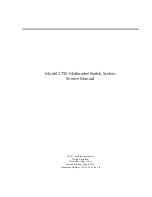
• If you have questions which remain unanswered by these operating instructions,
contact our technical support service or other technical personnel.
• In commercial institutions, the accident prevention regulations of the Employer’s
Liability Insurance Association for Electrical Systems and Operating Materials are
to be observed.
• In schools, training centres, computer and self-help workshops, handling of
meters must be supervised by trained personnel in a responsible manner.
• Before each use verify tester operation by measuring a known voltage.
b) Connected devices
• Observe the safety and operating instructions of any other devices which are
connected to the product.
c) Fuse
• A defective fuse must be replaced with a new fuse with the same specifications.
Do not repair or bridge a defective fuse, as this may cause a fire or result in fatal
electric shock!
d) (Rechargeable) batteries
• Correct polarity must be observed while inserting the (rechargeable) battery.
• The (rechargeable) batteries should be removed from the device if it is not used
for a long period of time to avoid damage through leaking. Leaking or damaged
(rechargeable) batteries might cause acid burns when in contact with skin,
therefore use suitable protective gloves to handle corrupted (rechargeable)
batteries.
• (Rechargeable) batteries must be kept out of reach of children. Do not leave
(rechargeable) batteries lying around, as there is risk, that children or pets swallow
them.
• All (rechargeable) batteries should be replaced at the same time. Mixing old and
new (rechargeable) batteries in the device can lead to (rechargeable) battery
leakage and device damage.
• (Rechargeable) batteries must not be dismantled, short-circuited or thrown into
fire. Never recharge non-rechargeable batteries. There is a risk of explosion!
43
















































